不定代词
常见不定代词的用法
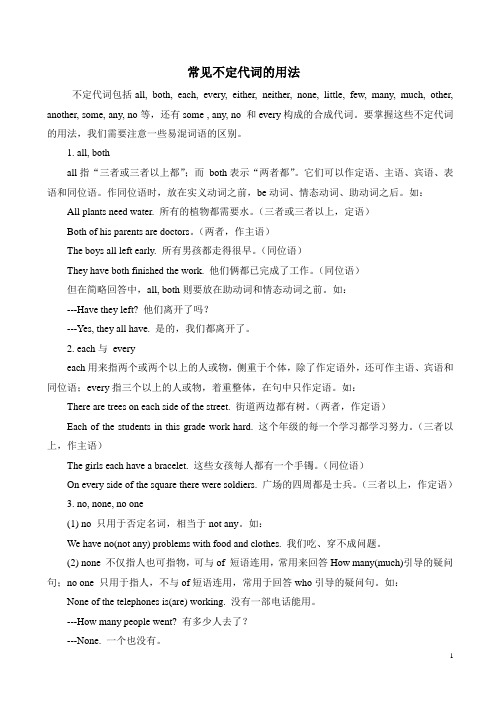
常见不定代词的用法不定代词包括all, both, each, every, either, neither, none, little, few, many, much, other, another, some, any, no等,还有some , any, no 和every构成的合成代词。
要掌握这些不定代词的用法,我们需要注意一些易混词语的区别。
1. all, bothall指“三者或三者以上都”;而both表示“两者都”。
它们可以作定语、主语、宾语、表语和同位语。
作同位语时,放在实义动词之前,be动词、情态动词、助动词之后。
如:All plants need water. 所有的植物都需要水。
(三者或三者以上,定语)Both of his parents are doctors。
(两者,作主语)The boys all left early. 所有男孩都走得很早。
(同位语)They have both finished the work. 他们俩都已完成了工作。
(同位语)但在简略回答中,all, both则要放在助动词和情态动词之前。
如:---Have they left? 他们离开了吗?---Yes, they all have. 是的,我们都离开了。
2. each与everyeach用来指两个或两个以上的人或物,侧重于个体,除了作定语外,还可作主语、宾语和同位语;every指三个以上的人或物,着重整体,在句中只作定语。
如:There are trees on each side of the street. 街道两边都有树。
(两者,作定语)Each of the students in this grade work hard. 这个年级的每一个学习都学习努力。
(三者以上,作主语)The girls each have a bracelet. 这些女孩每人都有一个手镯。
(同位语)On every side of the square there were soldiers. 广场的四周都是士兵。
不定代词
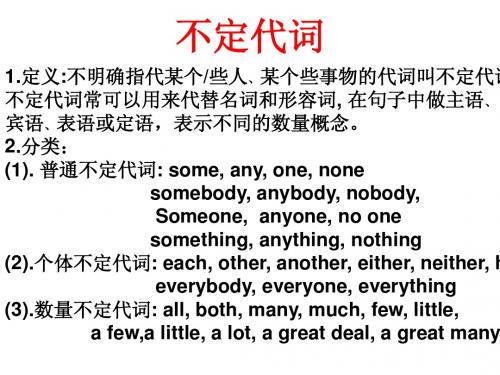
பைடு நூலகம்
1.some,any的用法 (1). Some和any意为“一些,某些,若干”,可修饰复数名词 或 不可数名词,some多用于肯定句中,可做主语、定 语、 宾语等; any 通常用于否定句、疑问句或条件句 中。 Eg: Some are reading, some are writing.(做主语) He has some friends at school. (做定语) There’s no meat in the fridge.Let’s buy some.(做宾语) There aren’t any birds in the tree. Are there any good museums in the city? (2).some可用于疑问句中,表示说话者希望得到对方肯 定的答复或表示真心建议、请求。 Eg: Would you like some bread? (3).any用于肯定句,表示“任何一个”或“任何种类”, 指三种或三者以上的人或物中的“任一个”。 Eg:You can buy this book at any bookstore in our city.
不定代词
1.定义:不明确指代某个/些人、某个些事物的代词叫不定代词 不定代词常可以用来代替名词和形容词, 在句子中做主语、 宾语、表语或定语,表示不同的数量概念。 2.分类: (1). 普通不定代词: some, any, one, none somebody, anybody, nobody, Someone, anyone, no one something, anything, nothing (2).个体不定代词: each, other, another, either, neither, h everybody, everyone, everything (3).数量不定代词: all, both, many, much, few, little, a few,a little, a lot, a great deal, a great many
不定代词用法
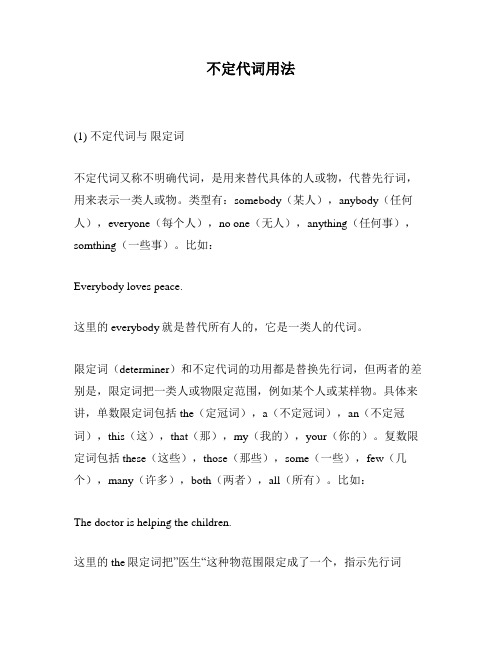
不定代词用法(1) 不定代词与限定词不定代词又称不明确代词,是用来替代具体的人或物,代替先行词,用来表示一类人或物。
类型有:somebody(某人),anybody(任何人),everyone(每个人),no one(无人),anything(任何事),somthing(一些事)。
比如:Everybody loves peace.这里的everybody就是替代所有人的,它是一类人的代词。
限定词(determiner)和不定代词的功用都是替换先行词,但两者的差别是,限定词把一类人或物限定范围,例如某个人或某样物。
具体来讲,单数限定词包括 the(定冠词),a(不定冠词),an(不定冠词),this(这),that(那),my(我的),your(你的)。
复数限定词包括these(这些),those(那些),some(一些),few(几个),many(许多),both(两者),all(所有)。
比如:The doctor is helping the children.这里的the限定词把”医生“这种物范围限定成了一个,指示先行词doctor指代的是一位具体的人,而不是一类人,一类物。
(2) 不定代词与名词不定代词常常紧跟名词一起构成短语,表示一类或多类先行词。
有时不定代词替代先行词中的名词,有时又用作补充,在名词和形容词之间,用来确定这个名词指代什么。
比如:Give me something to read.这句话的something就是一类人或物的不定代词,来补充表示具体的读物,而不是吃物或看物。
(3) 不定代词与名词性短语不定代词与名词性短语在句子中也有不同的用法,例如:He has something to say.这里的something就是一类人或物的不定代词,来补充表示”要说的“,而不是具体的内容。
(4) 不定代词与不定式不定代词也可以和不定式一起构成短语,表示一类或多类的动作,主要有something to do,something to think,something to say等,比如:He has something to do.这里的something就是一类人或物的不定代词,来补充表示”要做的“,而不是具体的事情。
不定代词与复合代词
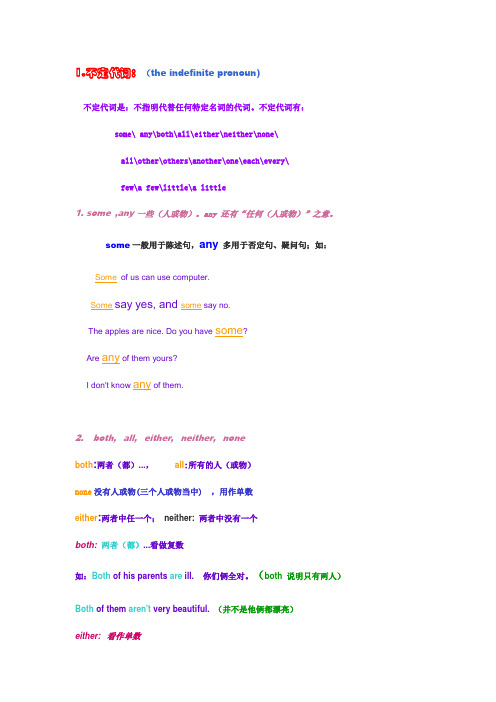
1.不定代词:(the indefinite pronoun)不定代词是:不指明代替任何特定名词的代词。
不定代词有:some\ any\both\all\either\neither\none\all\other\others\another\one\each\every\few\a few\little\a little1. some,any 一些(人或物)。
any 还有“任何(人或物)”之意。
some一般用于陈述句,any多用于否定句、疑问句;如:Some of us can use computer.Some say yes, and some say no.The apples are nice. Do you have some?Are any of them yours?I don't know any of them.2. both, all, either, neither, noneboth:两者(都)...,all:所有的人(或物)none没有人或物(三个人或物当中) ,用作单数either:两者中任一个;neither:两者中没有一个both:两者(都)...看做复数如:Both of his parents are ill. 你们俩全对。
(both说明只有两人)Both of them aren't very beautiful.(并不是他俩都漂亮)either: 看作单数如:Either of us may(情态动词)join the party. 你们(两人)中任何一个可以参加聚会。
Come to my home on Friday or Saturday. Either of them is ok.周五或周六来我家吧。
这两天中,哪天都行。
There's coffee or tea - you can(情态动词)have either (of them).咖啡或茶──你可以任选一种。
英语 语法-不定代词
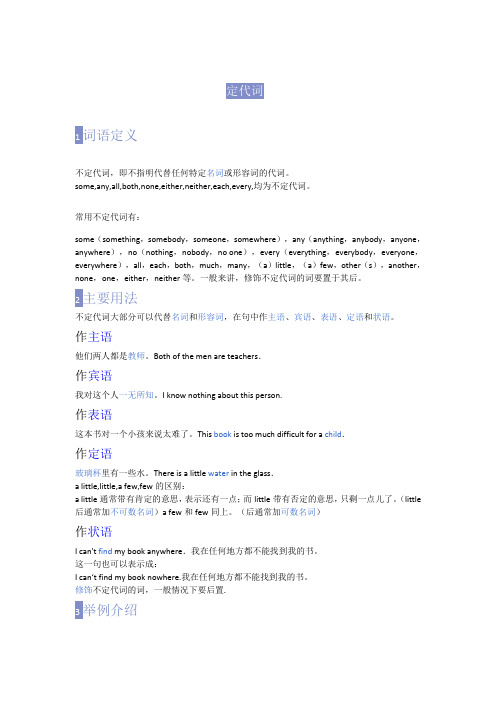
定代词1词语定义不定代词,即不指明代替任何特定名词或形容词的代词。
some,any,all,both,none,either,neither,each,every,均为不定代词。
常用不定代词有:some(something,somebody,someone,somewhere),any(anything,anybody,anyone,anywhere),no(nothing,nobody,no one),every(everything,everybody,everyone,everywhere),all,each,both,much,many,(a)little,(a)few,other(s),another,none,one,either,neither等。
一般来讲,修饰不定代词的词要置于其后。
2主要用法不定代词大部分可以代替名词和形容词,在句中作主语、宾语、表语、定语和状语。
作主语他们两人都是教师。
Both of the men are teachers.作宾语我对这个人一无所知。
I know nothing about this person.作表语这本书对一个小孩来说太难了。
This book is too much difficult for a child.作定语玻璃杯里有一些水。
There is a little water in the glass.a little,little,a few,few的区别:a little通常带有肯定的意思,表示还有一点;而little带有否定的意思,只剩一点儿了。
(little 后通常加不可数名词)a few和few同上。
(后通常加可数名词)作状语I can't find my book anywhere.我在任何地方都不能找到我的书。
这一句也可以表示成:I can‘t find my book nowhere.我在任何地方都不能找到我的书。
不定代词
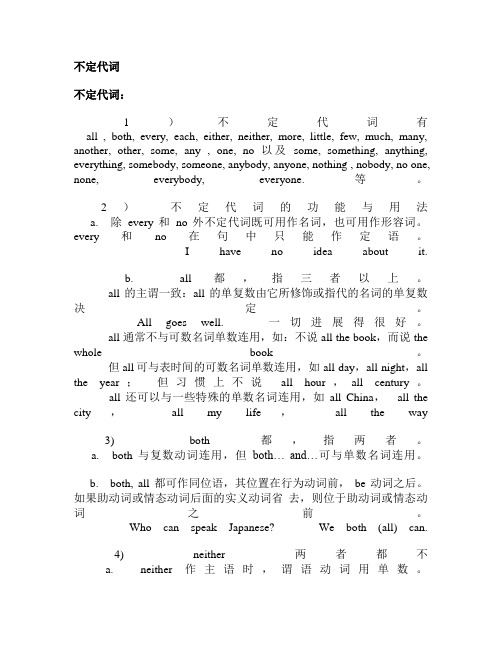
不定代词不定代词:1)不定代词有all , both, every, each, either, neither, more, little, few, much, many, another, other, some, any , one, no 以及some, something, anything, everything, somebody, someone, anybody, anyone, nothing , nobody, no one, none, everybody, everyone.等。
2)不定代词的功能与用法a.除every 和no外不定代词既可用作名词,也可用作形容词。
every和no在句中只能作定语。
I have no idea about it.b.all 都,指三者以上。
all 的主谓一致:all的单复数由它所修饰或指代的名词的单复数决定。
All goes well.一切进展得很好。
all 通常不与可数名词单数连用,如:不说 all the book,而说 the whole book。
但all可与表时间的可数名词单数连用,如 all day,all night,all the year;但习惯上不说all hour,all century。
all还可以与一些特殊的单数名词连用,如all China,all the city,all my life,all the way3)both都,指两者。
a.both 与复数动词连用,但both… and…可与单数名词连用。
b.both, all 都可作同位语,其位置在行为动词前,be 动词之后。
如果助动词或情态动词后面的实义动词省去,则位于助动词或情态动词之前。
Who can speak Japanese?We both (all) can.4)neither两者都不a.neither作主语时,谓语动词用单数。
b. 作定语与单数名词连用,但neither… nor 用作并列连词,可与复数名词连用。
不定代词用法
不定代词用法不定代词是一类特殊的代词,它们不指代特定的人或事物,而是泛指一类人或事物,具有不确定性。
在语法上,不定代词可以在句子中作主语、宾语、定语、状语等成分。
本文将探讨不定代词的用法,并举例说明。
一、不定代词用作主语1. Some people say that money can't buy happiness.2. Anybody can learn to play a musical instrument if they practice hard.3. Everything has its beauty, but not everyone sees it.二、不定代词用作宾语1. I want to buy something for my sister's birthday.2. Could you lend me your pen? I've lost mine.3. She knows someone who can fix the computer.三、不定代词用作定语1. I saw an interesting movie last night.2. Is there any milk left in the fridge?3. This is the only way we can solve the problem.四、不定代词用作状语1. He left without saying goodbye to anyone.2. Please feel free to ask me anything.3. She cried bitterly as if she had lost everything.五、不定代词的其他用法1. I can't find my keys anywhere.2. Nobody is perfect.3. Everyone should be treated with respect.不定代词有许多种,如somebody, anybody, nobody, everybody, something, anything, nothing, everything, somewhere, anywhere, nowhere, etc. 它们在句子中起到强调概括性的作用,使句子更为简洁明了。
16个不定代词用法口诀
16个不定代词用法口诀
好的,以下是一个口诀,帮助记忆16个不定代词的用法:
不定代词有些人,有些事,有些地方,有些时候。
有人,有事,有地,有时,都用some。
没有人,没有事,没有地,没有时,都用any。
所有人,所有事,所有地,所有时,都用all。
每个人,每件事,每个地方,每次时,都用each。
一些人,一些事,一些地方,一些时候,都用several。
不管什么人,不管什么事,不管什么地方,不管什么时候,都用whatever。
无论哪个人,无论哪件事,无论哪个地方,无论哪个时候,都用whichever。
不论多少人,不论多少事,不论多少地方,不论多少时候,都
用whatever。
有的人,有的事,有的地方,有的时候,都用
somebody/someone, something, somewhere, sometime。
没有一个人,没有一件事,没有一个地方,没有一次时,都用nobody/no one, nothing, nowhere, never。
所有人都用everybody/everyone, everything, everywhere, always。
每个人都用each other。
一些人都用several。
任何人都用anybody/anyone, anything, anywhere, anytime。
无论哪个人都用whoever, whichever, whatever, whenever。
希望这个口诀能够帮助你记忆不定代词的用法。
不定代词用法归纳
不定代词用法归纳一、不定代词概说英语的不定代词有 all, each, both, either, neither, one, none, little, few, many, much,other, another, some, any, no, (a) few, (a) little, both, enough, every 等,以及由 some, a ny, no 和 every 构成的合成代词(即 somebody, anyone, nothing 等)。
在这些不定代词中,多数都能作主语、宾语、表语或定语,但是代词 none 以及由 some, any, no 和 every 构成的合成代词只能作主语、宾语或表语,不能作定语,而 no 和 every 则只用作定语。
二、指两者和三者的不定代词有些不定代词用于指两者(如 both, either, neither),有的不定代词用于指三者 (如 all, an y, none, every) ,注意不要弄混:Both of my parents are doctors. 我的父母都是医生。
All of the students are interested in it. 所有的学生对此都很感兴趣。
There are trees on any side of the square. 广场的每一边都种有树。
He has two sons, neither of whom is rich. 他有两个儿子,都不富有。
He has three sons, none of whom is rich. 他有三个儿子,都不富有。
【说明】each 可用于两者、三者或三者以上,而 every 只用于三者或三者以上,因此用于两者时只能用 each,不能用 every 。
如不能说 There are trees on every side of the ro ad.三、复合不定代词的用法特点复合不定代词包括 something, somebody, someone, anything, anybody, anyone, nothin g, nobody, no one, everything, everybody, everyone 等。
不定代词和复合代词
不定代词概说不是指明代替任何特定名词(或形容词)的代词叫做不定代词。
不定代词有:some 一些(可数或不可数) somebody 某人someone 某人something某物,某事any一些,任何(可数或不可数) anybody任何人anyone任何人anything任何事物no 无(可数或不可数)nobody无人no one无一人nothing无物all全体,全部both两个neither没有人或物(指两个当中) none没有人或物(指两个以上)either任何一个(指两个当中)each每个every每个everybody每人,大家,人人everyone每人everything每一个事物,一切other (s)另一个(些)another另外一个,又一个much很多(不可数)many很多(可数)few很少(可数)a few一些,几个(可数)little很少(不可数)a little一些(不可数)one一个(人或物)不定代词的用法不定代词大都可代替名词和形容词,在句中可用作主语、宾语、表语和定语。
如:1)用作主语Both of them are waiters.他们俩人都是男侍者。
Is everybody here?人都到了吗?2)用作宾语I know little about the novel关于这本小说我知道的很少。
I am speaking for myself,not for others.我只代表自己,不代表别人发言。
I was interested in everything that the old man told me.我对于这位老人告诉我的一切都感兴趣。
3)用作表语That's all for today. class is dismissed.今天就讲这一些。
现在下课。
This book is too much for me.这本书对我说太难了。
4)用作定语Study well and make progress every day.好好学习,天天向上。
